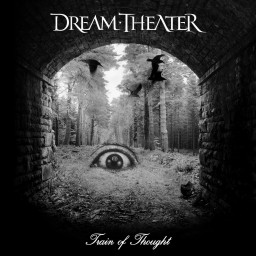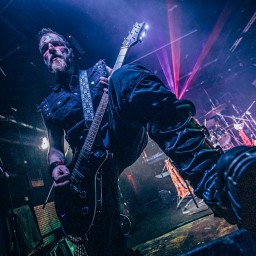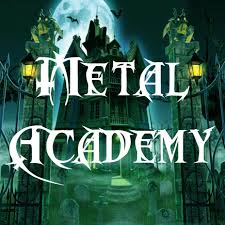Reviews list for Dream Theater - Train of Thought (2003)
When discussing the making of this album, the members of Dream Theater have said that their goal, inspired by all the "classic" metal albums by bands such as Metallica and Iron Maiden, was to make a record full of "live songs" that will work well in a concert setting. An album full of metal classics, that'll get energy flowing, fists pumping and heads banging.
They succeeded.
As is always the case when bands stray away from their original sound, there are some who dislike this record for being more centered on metal, as opposed to the progressive elements that Dream Theater made famous in the early 90's. Being a metal fan as much as a prog fan, I love this record, and whilst anyone can see that they stepped away from a lot of their progressive roots on this one, the band more than compensate for it with these pumping metal anthems.
Of course, at the time this album came out (November 2003) I was still fairly new to Dream Theater, and definitely more of a metalhead than anything else. So why wouldn't I love tracks like 'As I Am' (that riff...), 'This Dying Soul', 'Honor Thy Father' or 'In the Name of God'? Each track perfectly demonstrates why Dream Theater can stand toe-to-toe with any of metal's elite.
As you would expect from this band, the musicianship is phenomenal. Most of the songs are definitely guitar-centered, with keyboardist Jordan Rudess taking more of a backseat in most songs. But he's there none-the-less, and when he's trading solos with guitarist John Petrucci, especially on tracks like 'Stream of Consciousness', you know that there's no one that can match these guys.
'Train of Thought' certainly has its prog moments, but ultimately, this is an all-out, straight-up, ballsy metal album. And it's a damn good one, at that!
There comes a time in every musicians career where they hit a proverbial brick wall in their compositions and their fans begin to turn on them before they become a legacy act. It happened to Iron Maiden, Judas Priest, Anthrax, and even more so recently with a band like Mastodon. In many cases, the pivot happens when a band begins to commercialize their sound for a wider audience. Never has this been more true than the undeserved levels of vitriol that Metallica received with the self titled album from 1991 and the rest of their 90s work.
The same can be said for Dream Theater. The legendary progressive metal act is responsible for three of the genres most essential albums, even if they are not among the best in the subgenre. Following the bands great 2002 album Six Degrees of Inner Turbulence, the band quickly returned to the studio to record the follow-up, Train of Thought, which was released within the next calendar year! And at this point, I already had my suspicions about this album: the rollout for this album was far too short and abbreviated for it to possibly be as good (or better) than last years Six Degrees right?
Well, this is the album that led me on the path towards despising this band for quite a few years during the 2000s. As I mentioned briefly in my review for the bands 2019 album Distance Over Time, when this band became "the" progressive metal band, they stopped trying to bend the rules, and this album is exhibit A.
And here's the thing: Dream Theater were at the very least trying to fit in with the cool kids during the early 2000s, without digging into the absolute doldrums that was nu-metal at the time. But to be honest, the nu-metal elements don't even feel that significant! There might be an occasional faux rap verse on "This Dying Soul" or "Endless Sacrifice", but these are mostly in passing and only help break up the monotony that is, not just some of Dream Theater's least interesting songwriting of their careers, but also some of the most generic sounding progressive metal of the time.
This is certainly not helped by the production sounding really cheesy. Much of Mike Portnoy's drums sound thin, the guitar leads are nowhere near as memorable as the highlights from Six Degrees, and James LaBrie's vocals sound a lot less polished and generally flat throughout this record, an issue that has plagued even recent DT albums. Obviously you can't expect LaBrie to continue to sing the belting lines that existed on Images and Words as well as Awake, but even by those standards, I don't feel like their is a lot of heart going into these melodies. The album's lone saving grace is the bass work from John Myung; while the aforementioned drums feel thin, the bass does a lot of heavy lifting in carrying a lot of John Petrucci's lead guitar parts. Oh yeah, and Jordan Rudess decided to pick the absolute worst sounding synthesizers for his keyboard throughout the bands entire discography!
And where did the hooks go? "Stream of Consciousness" might have decent guitar lead as well as "This Dying Soul", but so much of this album is just not as sticky as what DT are capable of! Like who the fuck wanted to hear DT play "In the Name of God", a watered down progressive groove metal song? It feels lifeless and empty despite the fact that it is probably one of this albums least technical songs. Oh, did I mention that "Stream of Consciousness" is also a straight instrumental? Yeah, the best song on a Dream Theater album is the instrumental!
All of this is based on the assumption that Dream Theater are the quintessential progressive metal band; there is an entire branch of progressive metal that sole purpose is to try and recreate Images and Words. As the name suggests, these guys should be pushing boundaries within heavy metal music, not maintaining status quo for almost a decade. Train of Thought feels like a watered down version of Six Degrees of Inner Turbulence and what's even worse is that even Dream Theater knows it, so much so that they released Six Degrees again in 2005 under the pseudonym Octavarium.
And with all of that being said, I still can't call this DT's worst album. That honour belongs to Systematic Chaos from 2007, as it shows us a band that does not give a shit about their own music and created something that was formulaic and generic; quite the task for a progressive metal album! I give Train of Thought at least a little bit of credit for trying to do something creative and unique on the surface, but it is literally just surface level changes. St. Anger might be the equivalent of a musical dookie, but it is Death Magnetic that wreaks of non-effort. Let me know when DT are back to making soulful music again.
I can be a strange fucking creature at times. I mean I was a huge fan of Boston-based progressive metal legends Dream Theater from the moment I first heard their 1992 sophomore album “Images & Words” & there was a time in the late 90’s/early 2000’s when they were right up there with my favourite bands. So why in the actual fuck has it taken me this long to check out their 2003 seventh album “Train Of Thought”? Well, I guess it has something to do with the fact that I became completely obsessed with electronic music around the turn of the century & tended to focus all of my attention on my new obsession until I returned to metal a decade later. Since that time, I’d suggest that the generally middling reviews of Dream Theater’s later works have never really encouraged me to investigate them for fear of disappointment although I did check them out their live shows in both 2008 & 2014 & have always really enjoyed myself.
There’s been a lot of talk about “Train Of Thought” online & it’s reputation as one of Dream Theater’s most divisive albums was certainly well known to me before giving it my first spin. Many people claim that it saw the band trying to tap into the nu metal craze that was the flavour of the week at the time while others suggest that it was simply an attempt to make a classic metal record after getting great crowd responses to their cover performances of Iron Maiden & Metallica albums as well as their heavier original material on the preceding tours. Some say that the album lacks the ambition of past works due to the consistent focus on a heavier sound too & even suggest that some of the artistic license the band have taken has simply fallen in a jumbled heap. Then you have those fans with a slightly heavier taste in metal who claim this as one of Dream Theater’s best works so I really did go into the album having made a very conscious decision to keep an open mind & develop my own opinion.
The first thing I’ll say about “Train Of Thought” is that I can understand where ALL of those assessments are coming from. Dream Theater’s fan base is one of the most passionate & devoted you’ll find so it was almost inevitable that even the slightest change in direction would trigger some fairly extreme responses & whether they’re valid or not is really up the individual to decide. One thing that can’t be disputed though is that “Train Of Thought” was the band’s heaviest release to the time. John Petrucci makes full use of the lower register on his 7-string guitar & utilizes a bottom-heavy tone that you’d be more likely to expect from an alternative metal band than a progressive one. To capitalize on that, the band have given their heavier side an increased focus & you’ll get significantly less of the introspective atmospheric parts & poppier sections that perpetuated their past classics. This will no doubt please some metalheads & I probably fall into that category as I’ve always wondered what Dream Theater could accomplish if they simply tossed aside their shackles & went for broke. Unfortunately for your less open-minded fans though, there are a few sections that draw on nu metal for inspiration & those are generally the parts of the album that appeal to me the least however that only amounts to a riff or two here & there which isn’t out of line with Dream Theater’s history of toying with different subgenres, often within the context of the same track. The same could be said of the Metallica influence actually as there are some pretty blatant instrumental & vocal homages to them here, particularly their classic late 80’s period. I actually don’t think the band have even tried to disguise these parts as they’re so just so similar. To be fair, I’m not sure James LaBrie was up to a dirtier & more aggressive Hetfield style delivery though to tell you the truth.
But these moments are simply included to create interest in an otherwise very engaging & professional Dream Theater outing in my opinion. Despite what some people may have you think, “Train Of Thought” doesn’t really sound all that different to the Dream Theater of old. Mike Portnoy’s incredible drumming is as potent as ever with the unified rhythmic complexity being pulled off in a nonchalant fashion that thumbs its nose at the prog metal pretenders while the lead trade-offs between guitarist John Petrucci (my all-time favourite axe-man) & keyboardist Jordan Rudess are utterly ridiculous so there’s plenty here for the prog crowd as well as the metal one. So why isn’t “Train Of Thought” regarded as being in the same class as the classic Dream Theater releases of the 1990’s then? Well for me personally it’s about lack of genuinely anthemic vocal hooks. James LaBrie’s performance is certainly serviceable. In fact, he performs the role admirably however I can’t shake the feeling that he’s working within constraints these days & doesn’t explore his higher register unless there’s no alternative. This results in many of these long epics (there’s just seven tracks across the 69 minute run time) showing great promise but lacking the knock-out punch that would see you singing along with them in your head for the rest of the day like a “Pull Me Under” or “Take The Time”. You certainly enjoy them all while you’re listening to them & it’s hard to fault any of these tracks as this is a very consistent tracklisting but you have to wait until lengthy closer “In The Name of God” to reach the sort of heights you’ve become accustomed to from a top tier Dream Theater record. I actually feel like “In The Name Of God” is a magnificent piece of work that sits comfortably alongside the band’s best work but here it serves the additional task of reminding me that, while the rest of the tracklisting offered me some particularly solid progressive metal, it also fell a little short of what the band are capable of as song-writers. There certainly weren’t as many killer harmonized vocal hooks to dig their teeth in. Has the increased focus on the heavier aspects in their sound contributed to this? Perhaps but the closer certainly proves that the right balance can be achieved with that format.
So, the moral of the story here is that “Train Of Thought” is a rock-solid progressive metal outing that should well & truly satisfy both the prog & metal audiences if they can overlook the occasional inclusion of a simpler nu metal riff or laclustre attempt at more aggressive vocals. These moments are certainly the exception rather than the rule & have been overstated by many reviewers over the years. The rest of the album offers some chunky progressive metal performed by the very best in the business & if that’s not enough to float your boat then I feel that you’re hard to please.
For fans of Fates Warning, Haken & Pain Of Salvation.


 MartinDavey87
MartinDavey87
 Saxy S
Saxy S
 Daniel
Daniel